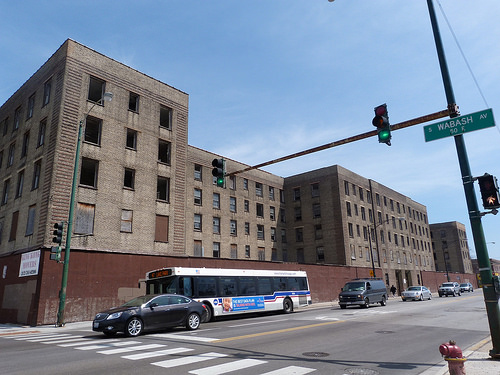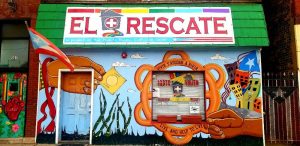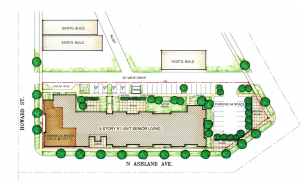
Rosenwald Courts is coming back to life.
After being vacant and neglected for nearly 15 years, the rehabilitation of the once storied apartment complex in the historic Bronzeville area is set to begin in the fall. But nearby residents are concerned the revitalized mixed-income housing building will revert to its rundown state without the support of consistent city services like public schools and sufficient commercial businesses like supermarkets.
“There is no infrastructure to support the new tenants of the Rosenwald, most of which will be seniors and single-mother families,” said Byron Williams, 49, a computer engineer and founding member of Rosenwald4All, a community group pushing for the redevelopment of the property. “The Rosenwald is in the middle of a food desert, failing schools and it is located on 47th Street, one of the most crime-ridden areas in Bronzeville.”
The National Historic Landmark, which was once home to leading jazz pianist, singer and musician Nat King Cole, legendary music producer Quincy Jones and Pulitzer Prize-winning poet Gwendolyn Brooks, will undergo a 12-to-18-month gut rehabilitation with occupancy set for early 2016.

Community members first learned about plans to rehabilitate the Rosenwald, located on the entire block between South Michigan and Wabash avenues and 46th and 47th streets, in a Chicago Sun-Times article written by David Roeder on October 18, 2011. In early 2012, Ald. Pat Dowell (3rd) started calling meetings with residents of the area to discuss plans proposed by Landwhite Developers LLC, an Indiana-based land developer who purchased the Rosenwald from Skokie-based owners AMA Realty Group LLC.
The original plan for 331 apartments was reduced to 239 units after encountering community resistance from the Rosenwald Transformation Task Force, a formal committee created by Dowell in April 2012 to work with the developer and her office on the redevelopment of the Rosenwald. The task force was disbanded by the alderman in November 2012 due to increasing opposition from residents.
“I am not opposed to mixed-income housing,” said Robbie Wheatley, 65, a resident on the 4500 block of South Michigan Avenue. “But mixed-income housing will never work if the buildings beside the Rosenwald are in disrepair. How can you charge people $4,000 in rent when the buildings around them are empty and in such bad condition? The Rosenwald will just end up the same as it was [right before it closed in 1999/2000 when the building was deteriorating], low-income housing.”
According to Virginia Pace of the Lighten-Gale Group, the financing consultant of Landwhite, 120 units will be supported by Project-Based Vouchers and ACC Assisted units for seniors, 105 units will be non-age restricted and will fall under the provisions of the Federal Low Income Housing Tax Credit Program and the remaining 14 units will be offered as Market Rate Units.
Residents fear the redevelopment of the Rosenwald based on its current plan will add to the already disproportionate number of public and government-subsidized low-income housing in the area.
Based on information from the U.S. Department of Housing and Urban Development, the Grand Boulevard neighborhood of Bronzeville has at least 1,085 Chicago Housing Authority public housing units, 1,349 units subsidized under the Housing Choice Voucher program (also known as Section 8) and another 1,384 units subsidized by the city and the federal government through LIHTC. The Rosenwald rehabilitation would add another 239 low-income households to the area, bringing the total low-income subsidized units to 4,057.

“You can’t put poor people on top of poor people,” said Mell Monroe, 58, president and commercial development liaison of the Bronzeville Area Residents and Commerce Council, a nonprofit organization committed to serving homeowners, condominium owners, renters and commercial enterprises in the historic neighborhood.
“It does not make sense and it does not work.” said Monroe. “There is no balance, there is more crime and as such the area cannot attract businesses like good supermarkets or restaurants. Public housing was eliminated because of poverty and crime.”
Based on Census Data from 2007-2011 on the City of Chicago data portal, Grand Boulevard has an average per capita income of $23,638 with 29.3 percent of households living below poverty. According to the Chicago Police Department, it ranks 27th among Chicago’s 77 community area for violent crime with at least four gang-controlled territories in operation on 47th Street for nearly 60 years.
The current plan for the Rosenwald includes 79,000 square feet of retail/commercial space on the first floor of the building, according to Pace. But Monroe says, “there has not been a commercial solution [like a 7-11 or bank] and no committed [commercial] tenants in the two years since the redevelopment plan was presented to the community.”
On October 16, 2013, City Council approved $125 million in tax incentives to support the revival of Rosenwald Courts. The subsidy which includes $25 million in tax increment finance funding, $58.6 million in tax-exempt bond sale, $34.2 million in low-income housing tax credit equity, $5 million Neighborhood Stabilization Program, $2.8 million in tax credits will be added to the $5 million interest-free loan from the city to complete the project. At the end of 2013, total city support was pegged at $130 million.
“The total projected cost for the project is approximately $110 million, which includes almost $70 million in construction costs. The balance is for acquisition, financing fees, reserves, soft costs,” said Pace. “$12 million is earmarked for the construction of retail/commercial space, which brings the remaining construction costs per residential unit to about $240,000.”
Residents like Williams and Monroe are wary of the use of taxpayers’ funds for such a “lackluster” and “conventional” design with “no value to neighbors or the community.” They are also worried that Dowell continues to wield her aldermanic power in favor of the developers’ plans despite the lack of community engagement.

“The Rosenwald has been a tremendous blight to the community for years,” said Dowell. “Now we have a chance to add more housing into the community, put more roofs over peoples’ heads. Housing developments like this will lead to more retail centers in the area, more pedestrian-friendly commercial areas planned. The redeveloped property will also result to tax rolls, which translates into tax dollars for the city of Chicago.”
In a letter to Mayor Rahm Emanuel dated October 19, 2012, members of Rosenwald4All, BARCC and Lakefront Alliance appealed for help about redirecting funds from LIHTC, TIF or other government subsidies for the Rosenwald to effectively reducing and fighting crime in Bronzeville, developing quality education, producing retail and developing positive, quality of life resources that are lacking in Grand Boulevard.
“The idea that something is better than nothing is not always good for the community,” said Monroe, who runs the Welcome Inn Manor, a bed-and-breakfast at 4563 S. Michigan Ave. “We have to take advantage of this opportunity to do something innovative to one of the most challenged streets in Bronzeville.”

















Be First to Comment